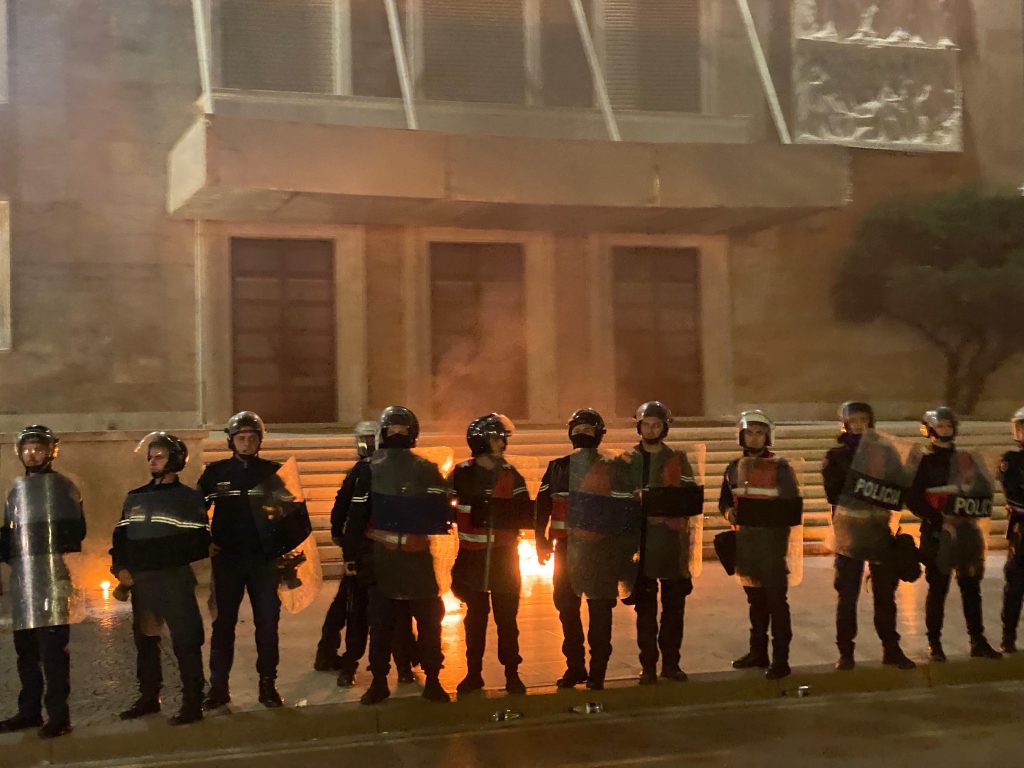Editorial note: Opposition’s October 7 protest, a study in self-destruction

Photo: Democratic Party protest
Economic historian Carlo M. Cipolla famously defined stupidity as causing harm without gaining any benefit. The leaders of the Albanian Democratic Party (DP) would have done well to remember this as they launched their October 7 protest. What was billed as a defining moment of civil disobedience quickly unraveled into a chaotic and self-destructive display of violence and disorder.
Civil disobedience traditionally involves peaceful defiance of authority to bring attention to injustice and rally public sympathy. What Tirana witnessed on October 7, however, resembled a rowdy crowd of football fans on a rampage rather than a political party engaging in peaceful protest.
The sight of smartly dressed Democratic MPs walking solemnly, as if on a casual stroll, while behind them a motley crowd of several hundred protesters threw Molotov cocktails, shattered windows, and reveled in violence did the Democrats no favors. The protest felt like a dissonant “walk in the park,” where the leadership appeared strangely disconnected from the wave of violence they were leading.
There was also the problem of numbers. Promoted as a historic turning point, the protest suffered from an underwhelming turnout and started late due to the lack of participants. DP leaders claimed their supporters were “stuck in traffic”—a bizarre excuse considering that one of the protest’s goals was to paralyze Tirana’s traffic.
Perhaps the most dangerous moment of the night came when protesters, led by Democratic MPs, attacked the Socialist Party headquarters with volleys of Molotov cocktails, risking setting the building on fire. Even in the worst moments of Albania’s post-communist history, attacking a rival party’s headquarters has been taboo. Such reckless acts not only risk provoking serious conflict but also polarize the electorate further, entrenching supporters behind their own parties. This is exactly what the Democratic Party must avoid if it wants any chance of winning future elections.
The violence then shifted to Tirana’s City Hall, where the same scenario unfolded. DP leaders have yet to explain how lobbing Molotov cocktails at City Hall advances their demand for a technical government. Worse still, small groups of masked men, likely the same ones involved in earlier attacks, went on to destroy streetlights, advertising boards, and public property. Despite facing aggressive crowds, the police showed remarkable restraint, although 12 officers were injured in the clashes.
The noise, Molotovs, and smoke couldn’t hide a painful reality: the opposition failed to mobilize public support. There was no spontaneous outpouring of people joining the cause of the Democrats.
The reason is clear. Despite attempts to frame the protest as a defense of democracy, the true focus was on DP leader Sali Berisha’s legal issues. Many Albanians chose not to back a protest led by a party whose leader is facing trial for corruption and has been declared persona non grata by respected international allies such as the US and UK. Moreover, Albania’s new justice institutions, including SPAK, which are responsible for Berisha’s legal troubles, are some of the most trusted in the country. In contrast, trust in the Democratic Party continues to erode.
For weeks, the DP has warned of threats to Albania’s democracy. While democracy in Albania is not without flaws, it appears the main threat currently comes not from the government but from an opposition that repeatedly fails to rebuild itself or present a credible alternative. Where a strong opposition should be, there is now a vacuum that rampaging protesters cannot fill.
What is happening in Albania may be unique. Political science defines regimes that oppress opposition as authoritarian or dictatorial, but it lacks a term for systems where the opposition is bent on destroying itself.


